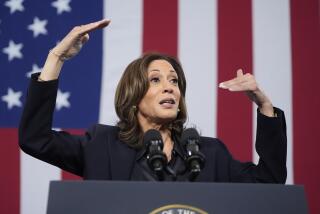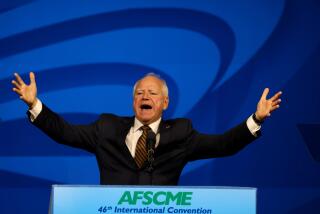Union battle in the Midwest a pull for political power
The labor fight blazing in Madison, Wis., and other state capitals is more than a feud over budgets or the rights of government employees. It is a battle that could fundamentally change the practice of politics in this country, with enormous consequences in 2012 and beyond.
By striking at organized labor, a pugnacious group of Republican governors is hitting at the heart of the Democratic Party, which banks heavily on union money and manpower. That explains the resistance from the White House, Democrats in Congress and, most fiercely, their liberal allies from New York to California.
âThis is all about pure political power,â said Paul Maslin, a party strategist whose office is just a block from Wisconsinâs Capitol. âIf they break the unions here, it will spread state by state, nationwide.â
Wisconsin Gov. Scott Walker has proposed deep cuts in benefits for most state workers, saying the belt-tightening is necessary to help close a projected $3.6-billion deficit. Labor unions have agreed to cuts in retirement and healthcare plans; if givebacks were the only issue, the impasse would presumably have ended by now.
But Walker, a newly elected Republican, has gone further by seeking to strip state employees of most of their collective bargaining rights. He would also make it harder for unions to organize state workers and collect dues, moves that could diminish laborâs clout and deplete its coffers, ultimately hurting Democrats who lean on that support.
Republican governors in Ohio and elsewhere are eyeing similar moves, in what amounts to the greatest threat to organized labor since President Reagan fired striking air traffic controllers in the early 1980s.
Walker and his allies see the moves as a necessary corrective after years of generous contracts that have grown economically unsustainable. âItâs not about busting unions, but going back to elementary high school math,â said Phil Musser, a GOP consultant and former director of the Republican Governors Assn. âYou have [government workers] essentially enjoying an outmoded set of benefits that have no bearing on the macroeconomic situation, either in the states or nationally.â
But Democrats see something more insidious: an attempt to undermine the party and its candidates by toppling one of its financial pillars. It is all the more alarming, they say, after last yearâs landmark Supreme Court decision freeing corporations, which heavily support the GOP, to make unlimited campaign contributions.
âItâs very simple. Wealthy individuals and corporations can still give six-, seven-, eight-figure checks to all the candidates, state parties and causes they want to,â said Michael Fraioli, a Democratic strategist who works closely with organized labor. âIf you take away unions and their ability to organize ⦠you cut at the heart of our financial support.â
He and others point, for instance, to the billionaire Koch brothers. One of the groups they financially back, Americans for Prosperity, has been organizing pro-Walker demonstrations in Madison.
Republicans, fueled by the fervency of the budget-cutting âtea partyâ movement, made big gains in November, seizing control of the House, winning a majority of governorships and fortifying their ranks in state legislatures. They see their victory as a mandate to shrink the size and scope of government, including the number of state and federal workers.
The Midwest has become a focal point of that effort for good reason.
No region of the country has suffered a more devastating loss of high-paying manufacturing jobs or private-sector union positions, which makes the ranks of unionized government employees â with their job security, healthcare and guaranteed pensions â a source of resentment.
âThere may have been a time when government employees needed protection and needed reform, but that was a long time ago,â Indiana Gov. Mitch Daniels, a prospective GOP presidential hopeful, told Ohio Republicans in a speech Wednesday night. He is waging his own fight with unions back home, over legislation that includes a bill to limit collective bargaining for teachers.
âPublic jobs grew while private jobs were lost,â Daniels said. âPublic salaries went up while private sectors are shrinking. Itâs time to interrupt that loop, in the public interest.â
There is the danger, of course, that Republicans are overreaching, as they say President Obama and Democrats did after their big victories in 2008.
Walker, for one, seems to have overstated things by claiming he campaigned on his collective bargaining proposal âall throughout the election.â
âAnybody who says they are shocked on this has been asleep for the past two years,â he said.
However, a scouring of the record by the Milwaukee Journal Sentinel and PolitiFact Wisconsin found no public statements in which the governor outlined his controversial position before taking office.
More broadly, it is not clear whose side voters are on.
A USA Today/Gallup Poll found that 61% of those surveyed would oppose a law in their state similar to the Wisconsin proposal denying public workers most of their bargaining rights.
And while public attitudes toward organized labor are not especially favorable â just 45% expressed a positive view in a recent Pew Research poll â attitudes toward big corporations were similarly middling, at 47% positive.
That is why union leaders have highlighted the behind-the-scenes role of the Koch brothers, who heavily contributed to Walkerâs campaign, and seek to portray the fight in Wisconsin and elsewhere as a battle against corporate greed.
âThis is a payback to the big CEOs and to lobbyists that spent billions of dollars in the last election going after the workers in various states,â AFL-CIO President Richard Trumka said on MSNBCâs âMorning Joe,â with some hyperbole.
Finding solace where they can, Democrats point to the passion in their ranks â MoveOn.org and other liberal groups have announced plans for demonstrations Saturday in all 50 state capitals, including Sacramento â and say it bodes well for turnout in 2012. âPeople arenât happy, but itâs got them fired up,â said Fraioli, the Democratic strategist. âItâs almost like they needed something like this to get their chins up off the ground after the 2010 election.â
Still, he conceded, it is never a good thing to fight from a defensive crouch. âWeâre not working for jobs, or trying to advance things,â Fraioli said. âWeâre just trying to hang on to what weâve got.â
More to Read
Sign up for Essential California
The most important California stories and recommendations in your inbox every morning.
You may occasionally receive promotional content from the Los Angeles Times.











